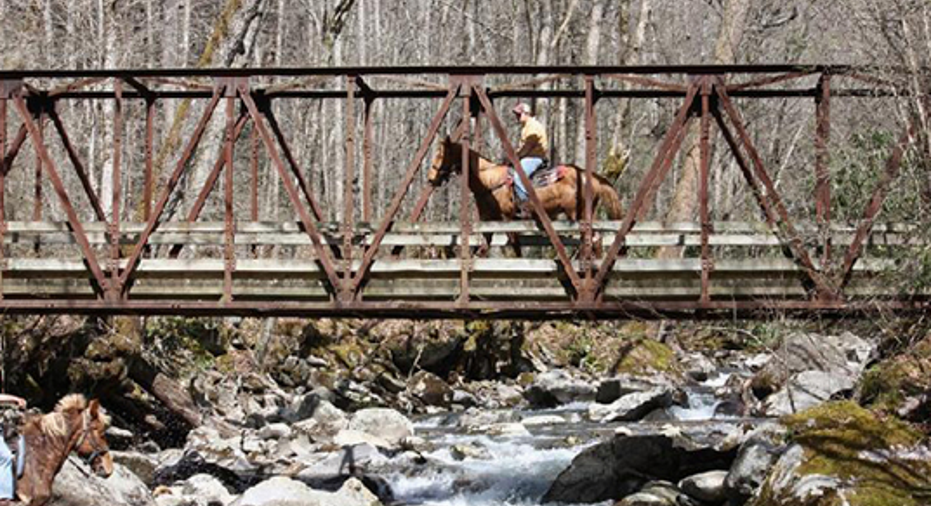Government Shutdown Spilling Over to Parks Businesses

Google is throwing a homepage celebration to mark Yosemite's 123rd anniversary as a national park, even though the park is shut down.
As the government’s partial shutdown begins Tuesday, all 401 national parks in the U.S. are officially closing their gates until further notice. And in the middle of leaf-peeping season – the height of tourism for many parks, including Acadia and Great Smoky Mountains – small businesses around the parks are feeling the pain.
“We’re forced to shut down, as the park is shut down,” says Jason Cook, the manager of the Smokemont Riding Stable in the Great Smoky Mountains Park. The stable offers horse-backing riding tours through the park, but Cook says all eight employees will be sent home indefinitely.
The Smokemont Riding Stable isn’t the only one hurting. Theresa Pierno, the acting president of the National Parks Conservation Association, says each day the parks are shut means a $30 million hit to local economies.
“It’s substantial for small businesses around the country –truly an economic crisis,” says Pierno. She says campers in national parks have already been informed they need to pack up and leave, cutting short vacations during the popular fall season.
“Barricades are going up around roads and monuments around national park units – we’re in that process today,” says Pierno. The National Parks Service website has already been taken down, making it difficult for tourists and business owners alike to learn more about what to expect during the closures.
Smoky Mountain Tourism Up in Flames
“The Great Smoky Mountains is the most visited park in the country, so it has the greatest impact on the local economy,” says Holly Scott, the marketing director for non-profit organization Friends of the Smokies. She cites a Michigan State University study that found visitors to the Great Smoky Mountains spent more than $818 million in 2011 alone, supporting nearly 11,500 jobs in surrounding towns.
“It’s the economic engine for the region,” she says.
While U.S. Highway 441, which runs through the park, will remain open, Scott says people are not allowed to stop along the road at the scenic overlooks, or break for lunch at one of the many picnic areas. She says the majority of the employees who will continue to work are law enforcement officers for the parks; they will be making sure tourists don’t try to circumvent the law.
As for businesses, Smokemont Riding Stable’s manager says the general mood is one of great anxiety.
“We’re feeling nervous. Everyone’s nervous when you’re used to working and feeling secure, and now you’re not working,” says Cook, who says the stable’s employees may be laid off permanently if the shutdown continues for an extended period of time.
“The park is a huge draw to the area for tourism, so everything will be affected by it – the motels, the restaurants, everything,” he says.
At the Foxtrot Bed and Breakfast, which is located near the park in Gatlinburg, Tennessee, owner Shirley Price says she’s concerned about the effect on the tourism industry.
“I think we’ll have a lot of upset people,” says Price, who says her B&B is booked solid for October. She is hopeful the Foxtrot will be able to survive, however, thanks in part to its 30-day cancellation policy, which forces booked guests to pay half the cost of their stay if they cancel within 30 days of their visit.
“This is the time of year that all of the businesses make their cushion, because through the winter months, we don’t have the volume,” explains Price.
On the other side of the mountains, in Waynesville, North Carolina, Brookside Mountain Mist Inn owner Carolyn Gendreau says she’s already had a booked guest call her with concerns about the park’s closing.
“I tried to get in touch with the park, but I couldn’t get answers or specifics as to what to expect. It’s a wait-and-see what happens kind of thing,” says Gendreau, who calls October the “peak of the peak” when it comes to tourism.
“Will it affect people coming into the area that haven’t been here in the past? Possible and very probable,” says Gendreau.
The little retail shops located around the mountains are also concerned. In Gatlinburg, there’s an 8-mile craft trail with dozens of artisans that depend on tourists coming to the Great Smoky Mountains.
Donna Baxter, who sells stained glass along the trail, says she’s been running her shop for the past 30 years.
“It concerns us, as that’s what people come here for usually,” says Baxter. “We’ll just wait and see.”



















